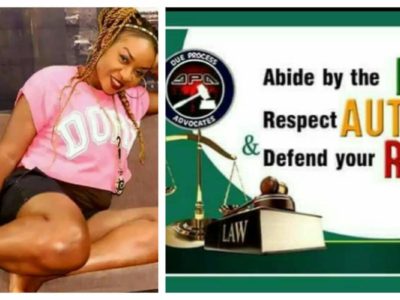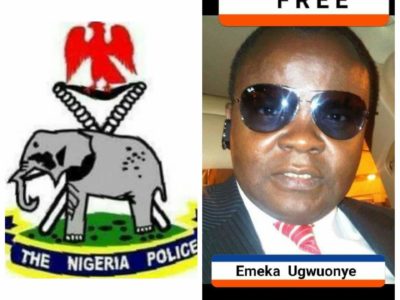Abusive Use of the Administration of Criminal Justice as Instrument for Political Control.
Yes, every government in the world uses the power to choose who, when and how to prosecute a person for a "crime" as a way to intimidate and control political opponents. But nowhere on earth is such abusive use of the prosecutorial powers of the state as rampant as in Nigeria at the present time.
Every democratic legal system makes efforts to check such abusive prosecutorial powers. That is what the due process rights of a person are meant to prevent. By setting clear standards and limitations for the government, individuals are protected from the tendency of government to single out their opponents and persecute them through improper indictments in criminal courts. The prevention of the abusive prosecutorial powers is the key reason for the establishment of the Due Process Organization (DPA).
Let us point out just a few examples of the dangerous and perversive manner in which successive governments of Nigeria and their agencies have abused this power.
This is probably one remarkable difference between the rights abuses committed under the military rule and those committed under civilian rule. Indeed, there have been far more Human Rights violations since 1999 than any comparable period during military rule.
The difference is that the military government abused your rights without much pretence of prosecuting you in a court of law. So, on the face of it, everybody could see that your rights are being abused. On the other hand, the civilian government will actually abuse your rights while pretending to go through the courts. Abuses by civilian governments end up more invidious and pervasive because they are disguised as rule of law and justice. Yet, it nothing other than jungle justice in practical effects.
For instance: much of all that has been done under the EFCC in Nigeria has been to use that agency to control and suppress opponents of the government of the day. EFCC has remained an instrument of political control. No wonder it spent much of its time at the early stages in impeaching state governors opposed to President Obadanjo.
Such abusive use of prosecutorial authority is seen recently most glaringly in the case of the Chief Justice of Nigeria. The government and its prosecutorial authorities fabricated sensational stories against the CJN, smeared and damaged his reputation, searched his office and lied against him in the media. All the agencies of the government - police, EFCC, the DSS, the Code of Conduct Bureau were all used. The same executive that does not know how to conduct elections could actually deploy enormous assets just to indict a CJN on fabricated evidence.
To have the CJN sit in the dock and answer questions was the ultimate aberration, and humiliation of the head of the judiciary. And that was just because the presidency saw him as an opponent that needed to be controlled, and chose to do it right through prosecution in a court of law.
Another glaring abuse of prosecutorial powers of the state is the current case of Emeka Ugwuonye. Compare that case with the case of Gani Fawehinmi working on Dele Giwa. The military government never thought of charging Fawehinmi with the murder of Dele Giwa. But the police did just that to Emeka Ugwuonye.
There are many more instances. About 80% of all prosecutions in Nigeria is done on the basis of fabricated evidence and often against those the government perceive as enemies.
DPA is an organization that is determined to curtail the abusive use of the prosecutorial powers of the state. This means that DPA will be working hard to strengthen the safeguards provided under the due process provisions of the law. The case of Emeka Ugwuonye is actually a potent weapon and the best training experience for DPA members. If any of them did not understand the dangers that the organization is meant to fight, now it is easy to understand it just by following the case of their Founder.
The Case of Emeka Ugwuonye against the Nigerian Police Drags On.
Yesterday, at the resumed hearing in the case,
Commissioner of Police v. Ephraim
Emeka Ugwuonye, it became clear that the case would drag out. This is too typical of Nigerian criminal trials. Once bail is not immediately granted, the accused person is as good as having been convicted. This makes nonsense of the notion of presumption of innocence. The accuser feels that his mission has been accomplished.
As if to further shock everybody, the judge admitted that she had not read the proof of evidence in the case because it was voluminous. What actually made it voluminous was that the police attached volumes of repetitive DPA posts on its Facebook wall. But the shock came from the fact that by admitting that she had not read the proof of evidence, the judge admitted that she failed to do what she ought to gave done early in the case. Emeka Ugwuonye's bail application called on the court to determine that nothing in the proof of evidence submitted to court linked Emeka Ugwuonye to the offences charged. That required the court to immediately assess the proof of evidence. But if court has not read the proof of evidence, then, how could it have reached its decision on Ugwuonye's bail application judicially and judiciously?
In yesterday's trial, David Aiyedegbon's cross-examination was completed. It became a problem rescheduling the next hearing date, as the police prosecutor insisted he would not be available on any of the days suggested in the next two weeks. With Easter close-by, it became harder to agree on a date in April.
Emeka Ugwuonye and his lawyers will focus on securing his bail before the next date set for the continuation of trial.
From every indication, Ugwuonye and his lawyers are optimistic and upbeat about the outcome of the day's proceedings.


